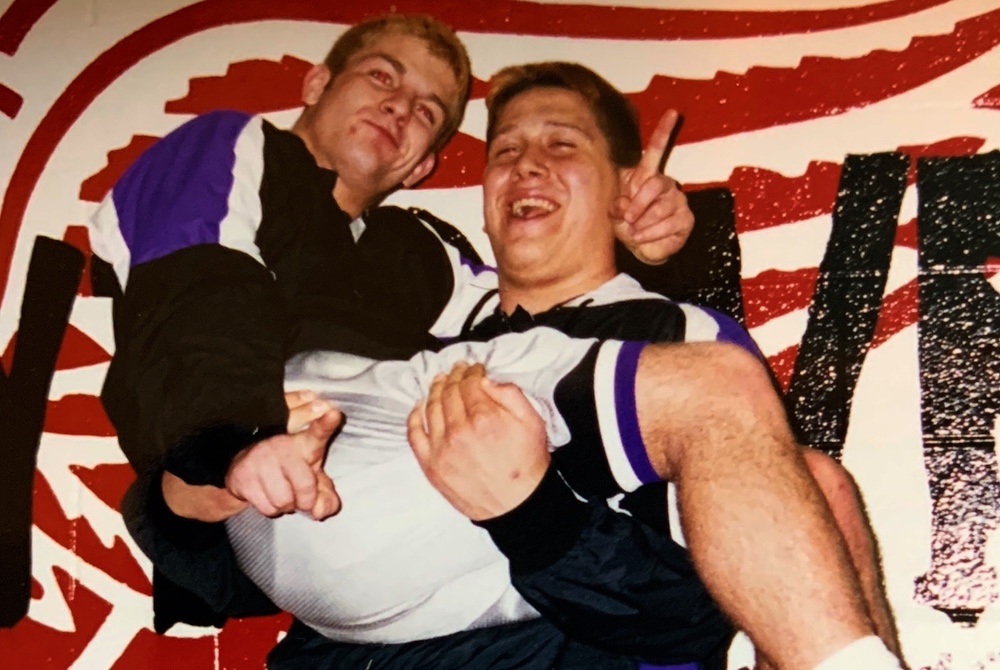
Caro Champs Find Common Ground Again as Mental Health Providers
By
Paul Costanzo
Special for MHSAA.com
July 8, 2021
Phil Millerov and Phil Niklowicz wanted to do more than simply defeat opponents when wrestling at Caro High School.
They wanted to dominate – physically and mentally.
 “We had this thing between us where we wanted to be done, and (opponents) didn’t want to come back on the mat with us,” Millerov said.
“We had this thing between us where we wanted to be done, and (opponents) didn’t want to come back on the mat with us,” Millerov said.
Twenty years later, both spend their days building people up. Millerov is a licensed professional counselor, while Niklowicz is a licensed therapist.
“I went out there looking to dominate and make sure it was known that I am the superior wrestler in all facets,” Niklowicz said. “I would try to run up as many points as fast as I can. I would teach the same thing when coaching, specifically with my nephew. You’re saying, ‘Listen, we want to break these people.’ Then the next day, in a therapy session, it’s like, ‘Let’s build up your self-esteem and set some goals to boost ourselves up.’”
The close friends and two faces of Caro’s surging wrestling program in the late 1990s now have very similar careers. Millerov – who finished second, third and first at 275 pounds in the 1998, 1999 and 2000 MHSAA Finals, respectively -- works in private practice at Transitions Counseling Service in Greenville, where he specializes in substance abuse disorders. He also has served as a Class 1 Fellow at the WK Kellogg Foundation.
Niklowicz – a two-time MHSAA Finals champion (1999 and 2000) and four-time placer – is working in private practice in Southfield, seeing mostly children. He also works in adult foster care with patients who have had traumatic brain injuries.
“He and I went and hiked Pictured Rocks at the beginning of May,” Millerov said. “And we joked about how nobody would have guessed that we’d be doing this now.”
That Millerov and Niklowicz are still close does not come as a surprise. Their friendship began when their wrestling careers did, as 6-year-olds in the Caro Growlers program. As they were becoming two of the state’s top wrestlers, they would share rides to tournaments, and their families grew close.
In high school, despite their size difference – Niklowicz wrestled at 135 his senior year – it wasn’t uncommon to see them warming up together.
“We were definitely easy going and liked to mess around a lot,” Niklowicz said. “We used to mess around before meets and throw each other. He would jump and I would throw him. People would look at us like, ‘Why is that little guy throwing that big guy?’”
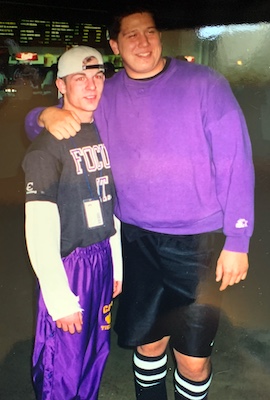 While their teams never made it out of the Regional, Millerov and Niklowicz helped set the stage for a program that would become among the best in Division 3 throughout the 2000s, qualifying for five straight Quarterfinals from 2003-07 and winning the Division 3 Finals title in 2003.
While their teams never made it out of the Regional, Millerov and Niklowicz helped set the stage for a program that would become among the best in Division 3 throughout the 2000s, qualifying for five straight Quarterfinals from 2003-07 and winning the Division 3 Finals title in 2003.
Individually, they were among the most well-known and feared wrestlers in the state.
“Niklowicz and I were fortunate to have each other, because we pushed each other,” Millerov said. “We were in constant competition with each other and ourselves. Just to kind of push each other, it was a great thing.”
Niklowicz finished fifth as a freshman and third as a sophomore before winning back-to-back titles to close out his career. In 1999, he defeated Nick Oertel of Goodrich 9-2 in the 125-pound final, and the next year he defeated Oertel’s teammate, Ryan Tripp, 7-5 at 135. Tripp would go on to win an individual title the following year. Niklowicz would finish his career with 214 victories.
“I think probably both (Finals titles) were equal,” Niklowicz said. “I think there was probably a little more stress going into my senior year. My motivation always came from improving, then it was maintaining the state title. You don’t want to go the opposite direction.”
Millerov lost a tight 6-4 decision against Remus Chippewa Hills’ Bob Kozlowski in the MHSAA Finals as a sophomore, and had an epic 12-10 match against future NFL defensive lineman Jason Babin of Paw Paw in the 1999 semifinals before fighting back to take third. The next year, he won his title via first-period pin against Dan Kliphuis, a two-time runner-up from Grand Rapids West Catholic. Millerov finished with 196 career wins and set the state record for pins in a career (160), which was broken the next season by Nick Simmons of Williamston and is now held by Justin Zeerip of Hesperia. The 56 pins Millerov recorded his senior season remains second all-time to Simmons, who had two seasons with 57.
“I never really thought about (the pin record) to be quite honest,” Millerov said. “It was just kind of in the background. It didn’t matter; all I cared about was winning this match, and I wanted to do it in the most effective, efficient way I could.”
They both continued their wrestling careers, but went their separate ways in college, with Millerov heading to Neosho County Community College in Kansas and Niklowicz to Virginia Tech.
Millerov had interest from several Division I schools coming out of high school, including some in the Big Ten, but he admits his grades weren’t good enough at the time. Neosho provided a chance to compete with some of the best in the country while at the junior college level, however, as the team took second at the National Junior College Athletic Association championships in 2002.
He transferred to Central Michigan after his sophomore year, joining his girlfriend – now his wife – who was already attending, and walking onto the wrestling team. While his relationship lasted, wrestling did not.
“I was distracted,” Millerov said. “My grandmother passed away in 2002 in that summer. I was trying to get that motivation back, and I just lost it. There has to be that edge with wrestling. When things didn’t work out, I struggled. Wrestling was my identity.”
Millerov was working to follow in his father’s footsteps and become a police officer. But the elder Phil Millerov, who died in 2012, talked his son out of it.
“Looking back on it, for me, it was obviously the right decision,” Millerov said.
The idea to go into counseling came after Millerov was married in 2006, as his wife had gotten into the program. He went back to school to earn his bachelor’s degree from CMU in 2007, and would go on to get his master’s from CMU, as well.
“I had taken a bunch of psychology courses just because I liked the field,” Millerov said. “I liked to be challenged. I liked puzzles, and with psychology, it’s like a new puzzle every hour. It just clicked. I flew through and graduated with like a 3.8. I was like, ‘Wow, I kind of feel smart.’ It was good to find something I was passionate about again.”
Millerov said he’s constantly learning and honing his craft, much like he did as a wrestler. A major difference now, however, is that he’s found more balance in his life.
“I think about working with athletes in addiction, I find a lot of similarities,” he said. “Wrestling was my life, it’s how I identified myself. I hear that same kind of talk around people struggling with addiction. One you’re considered successful for, the other you’re not. Most of my growth has been around finding balance. I find that my happiness and my clients’ as well, is when we found that balance instead of being good at just one thing. I want you to have passion, I want you to do things you love, but I also want you to be effective as a husband, a father, whatever other responsibilities you have.”
 Niklowicz’s journey to becoming a therapist was more telegraphed, as both of his parents work in mental health, and he said it was always something he wanted to do, as well.
Niklowicz’s journey to becoming a therapist was more telegraphed, as both of his parents work in mental health, and he said it was always something he wanted to do, as well.
He attended Virginia Tech on a wrestling scholarship, but transferred to Eastern Michigan after one year. The Hokies had recruited him to wrestle at 133 pounds, but when the team’s 125-pounder was injured, Niklowicz was asked to cut down further. Like Millerov, he struggled when his wrestling career ended.
“I just had a really bad taste in my mouth after leaving Virginia Tech and trying to cut all this weight,” he said. “Some of it was I had lost the desire to work out, to wrestle. Fifteen years, roughly, of my life was dedicated to wrestling, and once you stop, what do I do with my winters? What do I do with seven months of the year? It was definitely a part of my identity; that’s why I got into coaching. I did MMA fighting for a little bit to have something competitive.”
Like Millerov, Niklowicz said finding balance was important.
“In the mental health field, specifically, there’s a lot of burnout for people,” he said. “Every day, you’re listening to people talking about their problems, but at the same time, they’re coming for a reason and they’re there for help, so you have to provide that help and have to motivate yourself to come to the office every day and give it your best. I try to instill the motivation that I used to other people.”
When Niklowicz looks at his time as an athlete compared to his work as a therapist, he said that work ethic is the main characteristic that has carried over.
“I think my practice mentality was the same as it was on the mat,” he said. “Even in the wrestling room, these are people I’m friends with, people I grew up with, and I still didn’t want anyone to score on me. Then you just look at your work ethic outside of wrestling, whether you’re studying for exams or motivating yourself to get up and go to class.”
While they are no longer living in the same town or living similar lives – Millerov is married with three kids, while Niklowicz is single – the connection between Caro’s dominant duo remains strong, both professionally and personally.
“I don’t think we ever thought we would be going down such a similar path, and I doubt that either one of us grew up thinking we would do the exact same thing,” Niklowicz said. “We met when we were 6 years old, and we’ve been best friends forever. I think it’s hilarious that we’ve taken such similar paths but with some glaring differences. It’s definitely interesting that we’re still really good friends after 30-some years, especially since we’ve moved on and gone our separate ways.”
2020-21 Made in Michigan
June 28: Michigan's Minor Leaguers Making Up for Lost Season - Read
PHOTOS: (Top) Caro’s Phil Millerov lifts teammate Phil Niklowicz as both celebrate Division 3 championships during the 2000 Individual Finals at Joe Louis Arena. (Middle) Niklowicz, left, and Millerov were high school warm-up partners despite wrestling at significantly different weights. (Below) Niklowicz and Millerov take a selfie during a hiking trip to Pictured Rocks National Lakeshore in May. (Photos courtesy of Niklowicz and Millerov.)
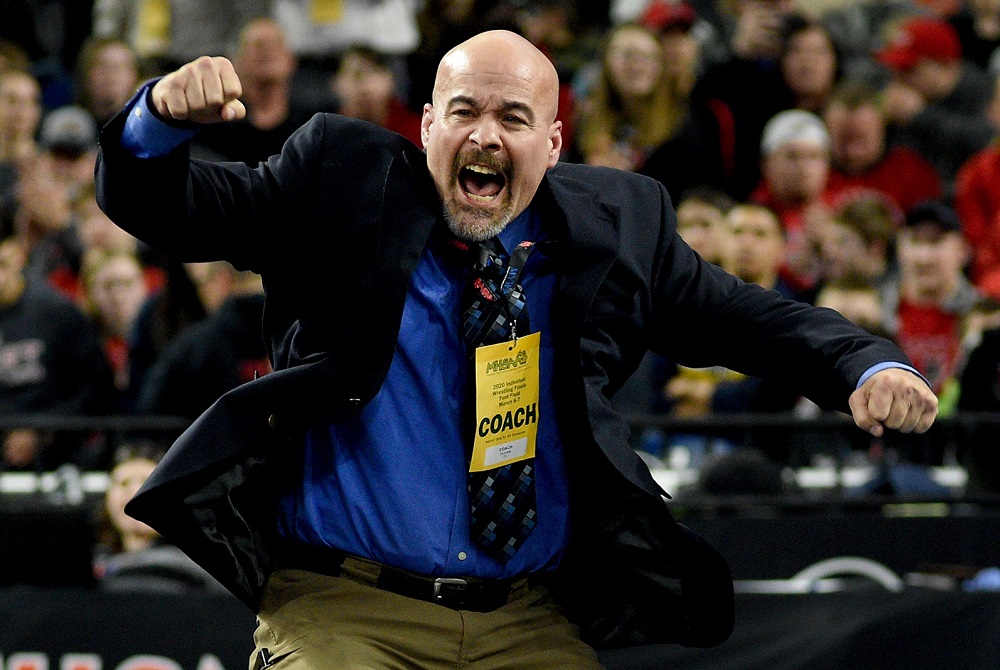
Dundee's Roberts Retires as 1st to 10 Finals Championships
By
Doug Donnelly
Special for MHSAA.com
March 9, 2022
Tim Roberts had an awakening.
 After winning the Division 3 championship in 2007, his Dundee Vikings lost in three consecutive Finals matches. Each were excruciating losses – 30-27, 33-25 and 24-23.
After winning the Division 3 championship in 2007, his Dundee Vikings lost in three consecutive Finals matches. Each were excruciating losses – 30-27, 33-25 and 24-23.
“We had a good program,” Roberts said. “We were doing well. But there was a period there where we were in the running but not winning. In 2011, I think it was the pinnacle. I realized we had to be different.
“We’d get close every year and lose at the state tournament. Too many times we were close. I knew we had to do something different.”
Not many coaches would have had the guts to change a program that had the success of Dundee, but Roberts wanted something more. The results speak for themselves.
The Vikings recently captured their fifth consecutive Division 3 title and ninth since 2011. The latest championship gave Roberts 10 total. He is the first wrestling coach in state history to win 10 Finals titles.
“We’ve been really fortunate,” said Roberts, who announced at last weekend’s Individual Wrestling Finals that he was retiring after 23 seasons and more than 500 career wins at Dundee. “It’s pretty cool to be the first to 10. There’s a lot of great coaches on that list with a lot of championships. It represents a lot of hard work by a lot of people.”
Roberts went into this Finals weekend tied with another coach from Monroe County, Bill Regnier, with nine championships. Roberts was an assistant at Dundee when Regnier coached his final match for Bedford. He’s a coach that Roberts still holds in high regard.
“He’s the legend,” Roberts said. “In every conversation, every poll, every time you talk about, Bill Regnier is considered the best wrestling coach ever in the state. To be mentioned in the same sentence as him is something special. He really is the legend.”
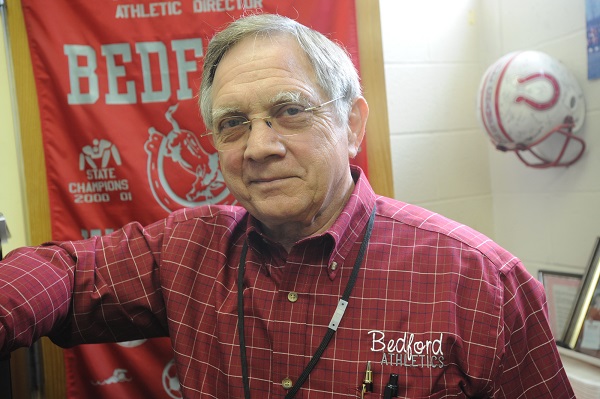 Hudson’s Scott Marry tied Regnier for second place on the list with his ninth Finals title last weekend. Lowell’s R.J. Boudro won his eighth title. Mike Rodriguez won seven at Detroit Catholic Central and one at River Rouge, and Mitch Hancock has won eight at Detroit Catholic Central.
Hudson’s Scott Marry tied Regnier for second place on the list with his ninth Finals title last weekend. Lowell’s R.J. Boudro won his eighth title. Mike Rodriguez won seven at Detroit Catholic Central and one at River Rouge, and Mitch Hancock has won eight at Detroit Catholic Central.
“I might have been the first to 10, but I won’t be the last,” Roberts said. “There are a lot of great coaches still coaching with a lot of championships. Scott Marry is not done winning state titles. He’ll be at 10 real quick. R.J. has won eight in eight tries.
“I don’t think 10 will stand long.”
Roberts’ run is remarkable, nonetheless. His Vikings won a District title all 23 years he was head coach and have won 30 straight overall. Dundee won its Regional in 22 of his 23 years.
Roberts doesn’t beat around the bush about Dundee’s goals every year. League championships are nice, District and Regional championships help fill up the trophy case. But, for the Vikings, winning the Finals championship is always the goal.
“That sounds arrogant, I know,” Roberts said, “but that’s the way it is. That is the goal every year. In all 23 years I coached, that was the goal.”
Roberts said his changes to the program around 2011 included adding strength training to the Dundee repertoire, and that was when Vikings coaches also started focusing more on the mental approach to the sport.
“After 2011, we hit our stride,” he said.
Roberts gives a lot of credit for the “Viking Way” to others in the program.
“Doing it this way starts long before the varsity level,” he said. “The kids club has to be strong. The middle school program has to be strong. You have to have a coaching staff on the same page and dedicated to all aspects of the team. It’s not one person, not even close.”
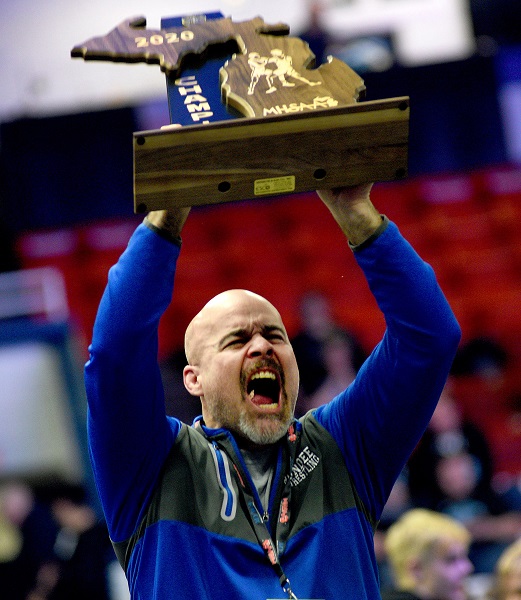 Roberts learned under Jim Wittibslager, who led Dundee to four straight Finals championships from 1995-98.
Roberts learned under Jim Wittibslager, who led Dundee to four straight Finals championships from 1995-98.
“That put me on a really good path,” Roberts said. “I learned how all of this works. Over time, you keep learning. You figure things out as you go. You have to build relationships with a lot of people because you can’t do this alone, not if you want to sustain success.”
Roberts has won numerous coaching honors, local and state, and was named the National Wrestling Coaches Association Boys Coach of the Year in 2020. The honors are likely to continue after this season. Dundee defeated Alma 55-12 in the Division 3 Final to conclude another dominating season.
Roberts said he had an idea this would be his last coaching the Vikings.
“Coming into this season, I was pretty sure I was going to be done,” he said. “As the season went on, I realized that it would be. This isn’t a decision I took lightly. I’ve pretty much been doing this my whole adult life.”
Roberts said no one should expect Dundee to fall off the mountain. Six Individual Finals placers were underclassmen, and kids from the middle school team to the youth programs won multiple championships.
“There are a lot of good people in place and some good wrestlers coming up,” he said. “The youth club is doing really well. It’s just time. It’s time to let someone else who has the passion and drive to do this take over.”
 Doug Donnelly has served as a sports and news reporter and city editor over 25 years, writing for the Daily Chief-Union in Upper Sandusky, Ohio from 1992-1995, the Monroe Evening News from 1995-2012 and the Adrian Daily Telegram since 2013. He's also written a book on high school basketball in Monroe County and compiles record books for various schools in southeast Michigan. E-mail him at [email protected] with story ideas for Jackson, Washtenaw, Hillsdale, Lenawee and Monroe counties.
Doug Donnelly has served as a sports and news reporter and city editor over 25 years, writing for the Daily Chief-Union in Upper Sandusky, Ohio from 1992-1995, the Monroe Evening News from 1995-2012 and the Adrian Daily Telegram since 2013. He's also written a book on high school basketball in Monroe County and compiles record books for various schools in southeast Michigan. E-mail him at [email protected] with story ideas for Jackson, Washtenaw, Hillsdale, Lenawee and Monroe counties.
PHOTOS (Top) Dundee coach Tim Roberts shows his characteristic celebratory enthusiasm during last weekend’s Individual Wrestling Finals. (Middle) Bill Regnier, here in 2009, built a legendary career at Temperance Bedford. (Below) Roberts holds up his team’s 2020 Division 3 team championship trophy. (Roberts photos by Tom Hawley; Regnier photo courtesy of the Monroe News.)

